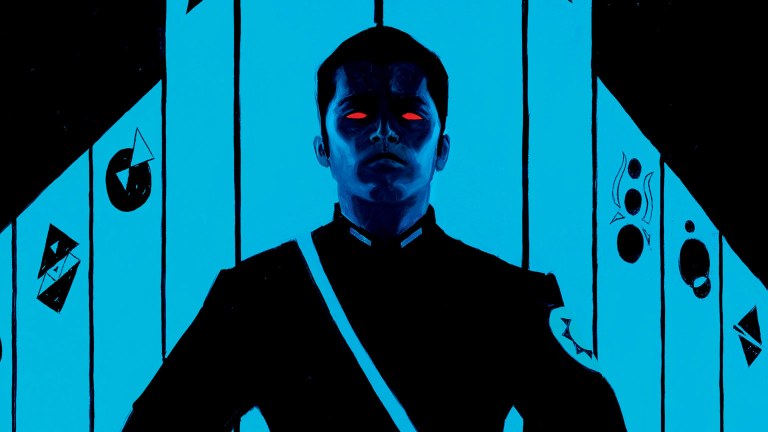Star Wars Thrawn Ascendancy: Chaos Rising Review
Thrawn Ascendancy: Chaos Rising is the latest Star Wars novel starring the infamous Chiss tactician. Here is our review of Timothy Zahn's latest.

About three quarters through the newest novel in Timothy Zahn’s long-running Thrawn series, a character notes that he “hadn’t the slightest idea what Thrawn was doing. But the small smile on the Chiss’s face chilled him straight to the bone.” If this is what you’re coming to this book for — tactical puzzles where you won’t really know what the protagonist is doing or why, but get to play an adoring Watson to his cold Holmes — you’ll probably like this.
Chaos Rising is more of the same, a series of puzzles that breaks a lot of the rules that govern a decent novel for the sake of its riddles and tricks. That could sound ambitious. In reality, for anyone who isn’t already under Thrawn’s spell, it’s repetitive, regressive, and boring, with nothing substantial (except those puzzles) to replace the missing characterization, context, and world-building. Zahn may be okay with writing the same book over and over, but I’m tired of reading them.
The Ascendancy series follows Grand Admiral Thrawn’s early years in the mysterious Chiss territory, far before he joined the Galactic Empire. Aliens called the Nikardun (their species is generally used as a synonym for their military) are gathering forces to try to take over neighboring species. Thrawn is the only one tactically brilliant enough to see their plan before it is set in motion. Unfortunately, his political blind spots and disregard for the Chiss’s family-led government hierarchy mean the Chiss authorities don’t trust him. So it’s up to Thrawn and his allies, including the almost equally cold General Ar’alani and a pair of Force-sensitive space navigators, to save the Chiss.
I’ve been saying for a long time that the best-selling Thrawn books are all the same. Typically, I’ve couched that in gentle understanding. If puzzles are what you want, here is a safe novel about puzzles and a character you may have known for decades. But with Chaos Rising leaning so hard into the exact same traits and victories Thrawn shows all the time, I’m tired of being gentle.
Stream your Star Wars favorites right here!
This novel doesn’t function. It might make you think it does with a smokescreen of characters asking deliberately and authoritatively about their thought processes, but especially in today’s political climate, it’s important to see whether there is actually any substance under the talk. This novel is the literary equivalent of a Sudoku pamphlet. Thrawn does not grow or change. When other characters grow and change, the result is usually an increased appreciation for Thrawn.
What exactly they’re saving is one of the book’s many weaknesses. Some locations, like the iced-over city and the Mitth family homestead, are unique and cool. But the trappings of culture don’t make up for how most characters’ voices sound the same or how unwilling the novel is to really commit to anyone except Thrawn.
I enjoyed some of my time with Che’ri and Thalias, one child and one adult from the Chiss’s strange Force-sensitive sect where navigators lose their Force abilities during puberty. There’s so much potential for tragedy and character-driven pathos in this concept. What do these people feel about losing their powers? Why do they lose them? Where are the Chiss equivalents of Anakin and Obi-Wan, the poster pair for what being Force sensitive means to their culture? The book isn’t interested.
A few cute scenes between Thalias and Che’ri are shadowed by a weird gender essentialism. Almost all Chiss navigators are women, and Che’ri calls her absent teachers “momish.” Not only is it an immensely silly term, it concretes the idea that this isn’t as broadly applicable as a Jedi teacher-student relationship. Chiss navigators can only relate to one another as adopted mother and daughter, as far as this book is concerned. I’m both offended and bored.
This regressive attitude toward gender is present throughout the book. Funny how alien gender assumptions look exactly like traditional human ones. Characters are actually referred to as “females” in 2020! In 2020! History is not a linear path of social progression, but a Star Wars author who has been involved with the fanbase for decades should know better. This is just embarrassing.
Overall, most of the characters are tools, not people. Qilori sides with the bad guys because he thinks they’re likely to be the winning side, with no history or depth to his choice beyond that. None of the aliens feel alien. They talk like character whose entire identities are built around being smart and want everyone to know it. This, plus the occasional Star Trek-ish mention of facial features, is what Zahn thinks Star Wars aliens are. The villain is a cackling pastiche who kidnaps women. For someone famous for creating the Star Wars Expanded Universe’s ultimate villain, Zahn can’t actually write villains. Even in Thrawn: Alliances, the best of the canon books about the art-appreciating admiral, the antagonists are as bland as the blank spaces on the Sudoku grid.
Chaos Rising dovetails with Alliances, placing it in the early years of the Clone Wars. I kept hoping for the book to make some connection to the larger Star Wars universe, like Alliances did. The connection never came. In particular, previous books made note of the irony that the Chiss navigators are named sky-walkers, but how exactly they’re connected to the human Skywalker dynasty, if at all, is never revealed or hinted at.
Another big problem with setting a book in the Chiss Ascendancy is that the thematic resonance of the good vs. evil story of Star Wars immediately disappears. Thrawn was created as a villain, an avatar of the Empire’s dispassionate crawl through the cultures it’s trying to consume. The lack of anyone on the moral high ground is a feature, not a bug.

